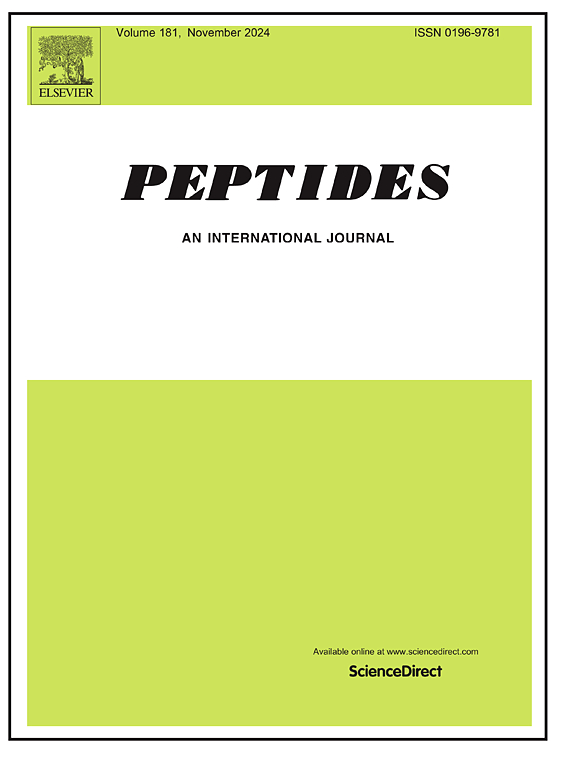从金华火腿中提取的七肽JHP-7 (QLLEELKR)可能通过抑制炎症反应和细胞凋亡来改善宫内粘连(IUA)
IF 2.9
4区 医学
Q3 BIOCHEMISTRY & MOLECULAR BIOLOGY
引用次数: 0
摘要
方法采用固相肽合成法(SPPS)合成JHP-7。研究采用了体外模型(10 ng/mL TGF-β1 诱导的人子宫内膜上皮细胞(HEECs))和体内模型(机械刮宫和 LPS 刺激诱导的 C57BL/6 小鼠)。在体外,将 HEEC 与含有或不含 JHP-7(1 μM 和 10 μM)的 TGF-β1 共同培养 48 小时,然后进行 RT-qPCR 和 Western 印迹分析。同时,采用荧光 ROS 探针评估氧化应激水平。在体内,用JHP-7(150 μg/kg/d和300 μg/kg/d)预防性治疗IUA小鼠14天,然后收集子宫组织,用H&E和Masson染色进行组织病理学评估,并通过RT-qPCR和Western印迹进行分子分析,以测量mRNA和蛋白质的表达水平。结果在体外,JHP-7 能显著抑制促炎和纤维化标志物的表达,减少 ROS,保护子宫内膜功能。进一步的研究表明,JHP-7 可抑制 TGF-β1 诱导的 HEECs 的凋亡,并降低 TLR4、p-NF-κB 和 p-MAPK 的表达。在体内,JHP-7 能明显改善 IUA 小鼠的子宫形态并减少胶原沉积。结论 JHP-7可通过抑制炎症和细胞凋亡改善IUA,这可能与TLR4/MyD88/MAPK/NF-κB信号通路有关。本文章由计算机程序翻译,如有差异,请以英文原文为准。
JHP-7 (QLLEELKR), a heptapeptide derived from Jinhua ham, may ameliorate intrauterine adhesion (IUA) via inhibiting inflammatory response and apoptosis
Objective
This study aimed to investigate the effect of JHP-7(QLLEELKR) derived from Jinhua ham on IUA, in order to provide new methods and new ideas for the clinical treatment of IUA.
Methods
The JHP-7 was synthesized by solid-phase peptide synthesis (SPPS). An in vitro model (human endometrial epithelial cells (HEECs) induced by 10 ng/mL TGF-β1) and an in vivo model (C57BL/6 mice induced by mechanical curettage and LPS stimulation) were used in the study. In vitro, HEEC were co-cultured with TGF-β1with or without JHP-7 (1 μM and 10 μM) for 48 h, followed by RT-qPCR and Western blotting analysis. Meanwhile, the fluorescent ROS probe was employed to assess oxidative stress levels. In vivo, IUA mice were preventively treated with JHP-7 (150 μg/kg/d and 300 μg/kg/d) for 14 days, after which uterine tissues were collected for histopathological evaluation using H&E and Masson staining, as well as molecular analysis via RT-qPCR and Western blotting to measure mRNA and protein expression levels.
Results
In vitro, JHP-7 significantly inhibited the expression of proinflammatory and fibrosis markers, reduced the ROS, and protected endometrial function. Further studies showed that JHP-7 inhibited the apoptosis of TGF-β1-induced HEECs, and reduced the expression of TLR4, p-NF-κB, and p-MAPK. In vivo, JHP-7 significantly improved the uterine morphology and reduced collagen deposition in IUA mice. Reduced expression of TLR4, MyD88, p-NF-κB, p-MAPK and up-regulating expression of Bcl2 were also detected after JHP-7 treatment.
Conclusion
JHP-7 could ameliorate IUA via inhibiting inflammation and apoptosis, which may be related to the TLR4/MyD88/MAPK/NF-κB signaling pathway.
求助全文
通过发布文献求助,成功后即可免费获取论文全文。
去求助
来源期刊

Peptides
医学-生化与分子生物学
CiteScore
6.40
自引率
6.70%
发文量
130
审稿时长
28 days
期刊介绍:
Peptides is an international journal presenting original contributions on the biochemistry, physiology and pharmacology of biological active peptides, as well as their functions that relate to gastroenterology, endocrinology, and behavioral effects.
Peptides emphasizes all aspects of high profile peptide research in mammals and non-mammalian vertebrates. Special consideration can be given to plants and invertebrates. Submission of articles with clinical relevance is particularly encouraged.
 求助内容:
求助内容: 应助结果提醒方式:
应助结果提醒方式:


